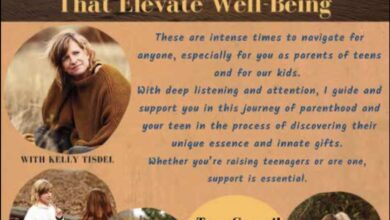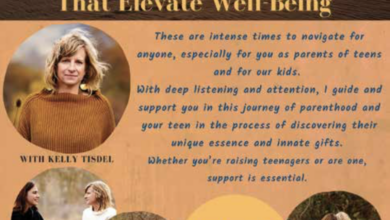Wholistic Mentoring For Teens & Parent Coaching
Kelly, You’ve been described as someone who has a natural ability to build deep rapport with both parents and teens. Can you share how this skill can help transform a difficult situation?
Building deep rapport requires us to stay open, and free of agenda, in a way that trust, connection, and respect is naturally fostered. This is especially important with teens, because they are hyper-sensitive to being perceived with judgment or through a critical lens. By the time a parent of a teen is reaching out for support, they also can feel exhausted and futile about their family situation or relationship with their teen. It’s essential and respectful for me to approach each new teen and their family with beginner’s mind, available to listen with openness and an authentic spirit of not-knowing. Rapport is fostered with a soft heart, genuine curiosity, and authenticity to the moment.
Across the board, the most difficult situations I’m invited into are ones where the teen has experienced a fair amount of relational trauma in a way that leaves them wary and defensive towards adults. Approaching the building of rapport with slow, gentle, non-invasive patience, can allow the opening to occur organically. When they feel my genuine curiosity, free of agenda, their defenses soften and they begin to let me in. I find humor is one of my greatest allies in this work. Sharing laughter and a sense of play can lighten and open gateways even while navigating tricky passages.
Many parents struggle with transitioning from parenting a child to parenting a teenager. What are some of the biggest mindset shifts parents need to make? Can you share a moment when a parent had an “aha” realization?
The imperative of every teenager is to individuate away from the nucleus of the family in order to eventually become a healthy adult. Simultaneously, this passage requires the parent to evolve alongside their teen, learning how to trust and surrender control in ways that often feel scary and counter-instinctual. As a parent of a younger child, it’s appropriate and necessary to lead, guide, and manage children’s environments. But as kids become teens, they need more autonomy in order to develop skills of responsibility and resiliency.
This is one of the trickiest transitions that I’m honored to support parents in, helping them to make the shift from “manager” to “consultant,” from “rescuer” to “coach.” Of course, this is a delicate process, and there’s a unique timeline to each teen’s growth process. However, when suffering between a teen and their parent is fundamentally connected to power struggles, this kind of shift in mindset can vitally transform the rapport between parent and their teen.
Without the connection, trust, and respect, teens feel the need to distance themselves and shut down. When parents can humbly see their part, and become more conscious about their own projections and unresolved wounding, it allows their teen to have the space they need to develop free of unconscious blind spots.
On a course I taught recently, after discussing how important it is to switch to the “coach” and let teens rise to meet their own life, the challenges, and the importance of not saving them from every failure, one parent noticed that when she was sick, her kids naturally rose into the places she usually felt she needed to micromanage. “I guess, I can really put down my clipboard, so to speak, and let my kids handle things more.”
You talk about creating a space where kids and parents feel truly seen and heard. Can you describe a moment when you saw this safe space lead to a breakthrough for a family or mentee?
I have one mentee who had a particularly tough exterior, resistant and distracted by her environment, notably avoidant to becoming vulnerable, seen, and known.
Creating safety in this situation asked me to back all the way up, slow way down, let her direct at the pace that worked for her, and follow her lead as far as what she felt comfortable to share with me. Humor was essential in this case, as a way of lightening the field, and allowing her to open at her own pace. We are two years into this deeply connected relationship now, and it took at least nine months before she felt safe to share her world with me.
You help families through difficult discussions—whether it’s conflict resolution or deep emotional conversations. Please talk more about the role you play with this.
When I’m called upon to serve in family mediation, it’s essential to create a safe container in which everyone feels like their voices and needs are valid and heard. The health of the family is the goal. My capacity and commitment to show up as a powerful advocate for the teenager in these moments, helping them to voice their experience and feelings, allows for real listening and understanding to occur. The family comes out of these experiences feeling more hope and gaining deeper understanding of each other. Agreements can be put in place that are revisited to see how progress and growth is happening. I help to hold the opening for more truth to come through in a way it can be heard. Sometimes it just takes another person holding space to see things from a different angle and create a fresh solution or outcome.
Teen mentorship is a big part of your work, as well as the occasional circle. What is it about your approach that makes teens trust you? Can you share a moment when you saw a teen truly open up and change through mentorship?
While there is undoubtedly a place and need for traditional therapy when it comes to teens and their families, there are teens that can become allergic to “talk therapy.”
While mentorship can include therapeutic wisdom and conversations, the uniquely designed container of this approach, has the flexibility to meet each teen and family in their evolving needs and desires. We can hike, or paint, or go for a drive. We can get tea and talk at a coffee shop or write. Some mentees will even text me from time to time when they need reminders on how to ground or need quick reflection on something that just happened. I’ve even made audios for a few kids to listen to before sleeping that helps them calm their body, focus on their breath, and release the day.
Teens thrive on being met where they are now, seen in their challenges and their gifts, and not held to their past mistakes or even their wounding. Seeing and encouraging their potential and locating possible next steps allows for more confidence and positive regard for the future and their goals.
One teen first started seeing me her freshman year. She’s a senior now. She embodies quiet strength and can be shy in social settings. Navigating the high school social arena brought many challenges, painful interactions, and feelings of not fitting in. In our time together, we go for walks, drives, and in times when she feels angry, we’d even do more somatic practices of feeling the anger while hitting a tree with a stick. “That felt so good,” she would remark. Now, she walks through the social waters without letting the dynamics that haunted her for years bother her. She embodies herself with more confidence and decides where she is going to put her attention.
You often say that parenting teenagers starts with parents looking at their own emotional patterns. Please talk more about this.
Raising teens is an opportunity for parents to step up into personal accountability and what it means to embody a healthy, regulated nervous system. This is no small task when a teenager is pushing all their parent’s buttons, but to be able to pause, step back, and remember a greater perspective is what can allow moments of potential rupture to instead become bridges of compassion, rapport and mutual understanding.
As humans in relationship, we are constantly co-regulating with one another. Even though it can seem like a teenager’s hormones and volatile emotions are running the show, it’s up to the parent to bring a grounded, centered nervous system to the field with which their teen can co-regulate.
This can be a steep learning path, and requires continuous patience alongside a lot of self-compassion. But it is essential to health within the family.
Teens have an undeveloped brain. They are still growing their frontal lobe, responsible for executive functioning like decision making and cause and effect. They are impulsive and are on a roller coaster ride of the amygdala’s hormones and emotions.
They need a calm place to ground. A parent’s mature nervous system influences the entire waters of the home.
You take a long-term, deeply committed approach to working with teens. Can you share a story of a young person you’ve worked with for years and how they’ve grown through your guidance?
I’ve lived and worked with kids and families in the Valley for over twenty years. In a small town, where many of the teens I have been privileged to mentor and teach come home for summers, or family visits, or even to settle down in young adulthood, I am humbled by the mirror of their heart as we see each other again, always connected.
A boy I taught through the middle school years, and then mentored through high school, still calls me to go for walks or a drive. We talk about life and the tricky places in his world, as he seeks reflection and remembers skills to approach the hard places.
Another girl I worked with through high school lost her father to suicide. She developed an unhealthy relationship with alcohol and had struggles with her mother. We met weekly throughout these years, one-on-one and in conversations with her mom. Now, in her mid-twenties, she is vibrant, has a strong community, and is a preschool teacher in California. We stay in touch and every time we see each other, she expresses gratitude for the support and belief in her that I had during that time.
Your work is deeply personal and requires immense dedication. What keeps you motivated every day?
What calls any of us to the work we are designed for? What a mystery this is. What I can say is that I’m deeply moved by the firestorm, tenderness, and potential that is the especially inspiring and rewarding time called adolescence. I love teenagers. I see through their protective layers into the heart of who they are and help to call their unique brilliance forward.
The family structure is the foundation teens launch into the world from. Watching families gain certain skills, make agreements, and have important conversations while each person is heard… and then to notice how their entire landscape can shift towards more health and ease because of that, is incredibly beautiful.
Each relationship is unique. What works for one person, is different for another. I like the challenge of being on my toes to find the thread of truth and essential nature of each person I’m with. I learn from them, just as much as they’re learning from me.
Learn More:
541-324-9003




